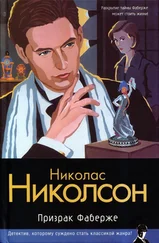‘No,’ says Larry. ‘This is Pammy’s dance.’
Kitty throws him a quick grateful look.
‘Last time we played this song,’ Kitty tells Geraldine, ‘there was a foot of snow outside and we could hardly get out of the house.’
‘Oh, that terrible winter,’ says Geraldine, watching the dancers. ‘Ed is a graceful mover, I must say.’
‘Unlike me, she means,’ says Larry.
‘Not at all! You’re a very good dance partner, darling. But Ed looks so relaxed, while at the same time being so very much in charge. He’s the pure English type of hero, isn’t he?’ This is for Kitty. ‘Going into battle as if he’s taking a stroll in the park.’
Kitty doesn’t answer. She’s watching Ed and feeling how much she loves him, and how much it hurts.
PART FOUR: A GOOD MAN (1950)
33
Early May in London, and the last of the day’s sunshine lingers over the city. Larry leaves the office early and walks home, as he often does, through the park. Past the Serpentine and the Round Pond where he sailed his boat as a child, just as other children are doing today; and so to the streets of Kensington.
There is a conversation waiting to be had, about which he is not thinking.
As he enters the house, Geraldine appears from the garden to greet him with a kiss, in the usual way, but he has learned to read the small signs. When under stress she retreats into efficiency, doing whatever is to be done with extra care and precision. This spring afternoon she has been weeding the rose beds in their town garden. She wears an apron, and carries a shallow basket to collect the weeds, and a small two-pronged fork.
‘Do you mind if I carry on? I’m almost finished.’
‘No, of course not,’ says Larry.
He follows her out down the back steps, and settles himself on the garden bench. Geraldine kneels down on a rubber mat and digs away with her little fork, neither hurrying nor lingering over the task. She says nothing: waiting for him to begin.
‘So how was the doctor?’ says Larry.
‘He was extremely thorough,’ she replies. ‘A very professional man.’
Larry waits for her to say more, but she seems intent on her weeding.
‘Was he able to help?’
‘Yes, I think so,’ says Geraldine. ‘He was able to reassure me on some points. There’s no physical problem, he tells me. No’ – her voice trembles for a moment – ‘no physical defect.’
‘Good,’ says Larry. ‘Good.’
‘He told me that my situation is not unique. Far from it.’
She tugs out the weeds from the loosened soil and lays them carefully in her basket.
‘And did he suggest that something can be done?’
‘Time, he said. Time.’
‘I see.’
Geraldine stops weeding. She rises to her feet and stands with her back to him, her head bowed. This is how she asks for affection. For a brief moment Larry rebels. He feels a pulse of anger go through him, that she should claim the role of the victim. Then he sees the way her basket shakes on her arm, and his anger melts into pity.
He gets up and goes to her, folding her in his arms. At once she turns round and presses herself to him.
‘Oh, Larry. It was so horrible.’
She puts her basket on the ground and drops the gardening fork into the bed of weeds and begins to cry in soft gulps.
He holds her close, kissing her cheek, soothing her.
‘All over now,’ he says.
‘I know he’s a doctor, I know he does it all the time, but it was so horrible. I had to undress. I had to … I don’t want to say it, I don’t want to remember it.’
‘But he told you there’s nothing wrong, that’s the important thing. It’s good that we know that.’
She clings to him, sobbing.
‘Nothing physical,’ she says. ‘Not physical.’
‘Did he have some other suggestion?’
‘He said if I wanted I could see … see a psychiatrist. He said it might help. He couldn’t promise. He said some people benefit from talking … talking about it. Not everyone. Not most, even, he thought. He said sometimes these things just have to be accepted.’
‘I see,’ says Larry.
‘Darling, I’m sorry, but I couldn’t bear to talk about it with some strange man. I just couldn’t. It would kill me.’
‘Then you shan’t,’ says Larry.
‘Oh, darling, darling.’ She kisses him gratefully. ‘I’ll make it up to you in other ways. You’ll see. I’ll do everything for you. I’ll be such a good wife to you.’
‘You’re that already, my love,’ says Larry.
But his heart is heavy.
She wants to talk. She wants him to understand.
‘I’ve been thinking about it so much since I got home. At first I was desperate, I kept telling myself how terrible it was, I couldn’t see any way to carry on. So I did the only thing I could. I prayed about it. And while I was praying, I don’t know why, I remembered what that Indian friend of yours told us, when we went to the abandoned city. Do you remember? He said it was the words of Jesus, carved on an arch. “The world is a bridge, pass over it, but build no houses on it.” I don’t really think they’re the words of Jesus at all, but I think they’re beautiful, and true. This is only a bridge, darling. What really matters is the world to come, on the other side. And when I thought that, I became calmer. I said to myself, this is the burden we’re asked to carry in this life. This is our cross. But we still love each other. We’re still married. We can still make each other happy. I’m right, aren’t I, darling? So long as we’ve got each other, we’re rich in love. Then I saw that there’s a kind of vanity, or maybe it’s greed, in expecting to have everything. Think how many cripples there are in the world, how many starving people. This is our cross, darling. Not so heavy a cross, once you get used to it. I know you want children. I know I do too. But if Almighty God is asking us to offer up to him that dearest hope of our hearts, then let’s do it gladly! Let’s not go about with sad faces, as if we’ve lost the one thing that makes life worth living. You at least understand, darling, and I so thank God you do, that this life isn’t everything. This world is only a bridge. Eternity, my love. We must fix our eyes on eternity!’
Her beautiful eyes shine with a kind of ecstasy as she speaks, and she draws him into a kiss more passionate than any she has given him before.
After this Larry asks her no more. He is aware that she is more conscientious than usual, anticipating his wishes and deferring to his preferences, even when he hasn’t expressed them. Having noticed the wordless tussle that takes place over The Times each breakfast between Larry and his father, she orders a second copy to be delivered: a simple solution that had not occurred to either of them. She discovers the date of Cookie’s birthday and makes her a small present in Larry’s name, and forewarns Larry so that he’s prepared for Cookie’s touching gratitude. She memorises the names of the humblest people in the Fyffes head office – the doorman, the cleaners, the junior secretaries – and makes a point of using them, knowing this will please Larry. She can tell almost before he knows it himself when his war wound starts to hurt him, and makes sure there are painkillers available. She’s sensitive to his moods, and takes care to leave him alone when he wants to write letters, or read a book. She never criticises him, or interrupts him, or makes those sharp little jokes with which married couples sometimes pinch each other. And always, without exception, she looks lovely.
Larry’s father thinks the world of her. His colleagues at head office are all half in love with her. Larry is universally said to be a lucky man. But Larry himself struggles with darker feelings.
Читать дальше












